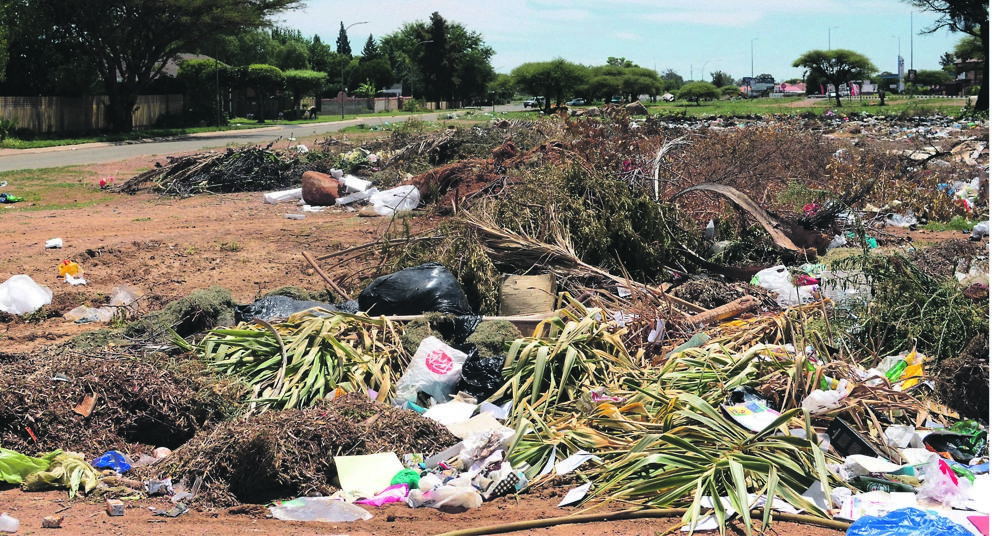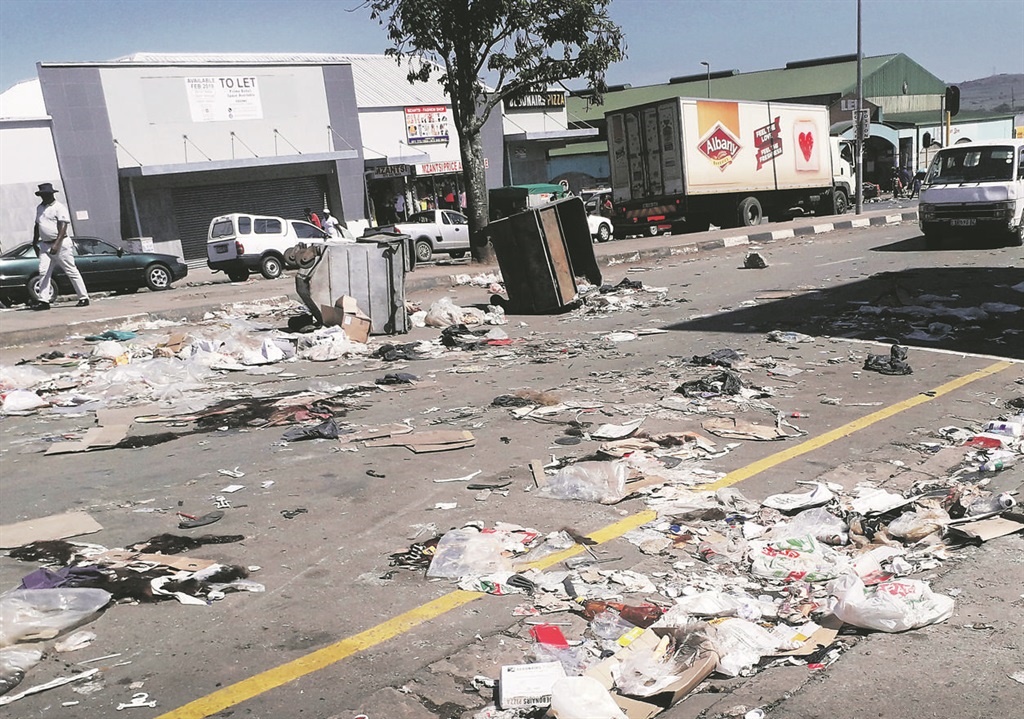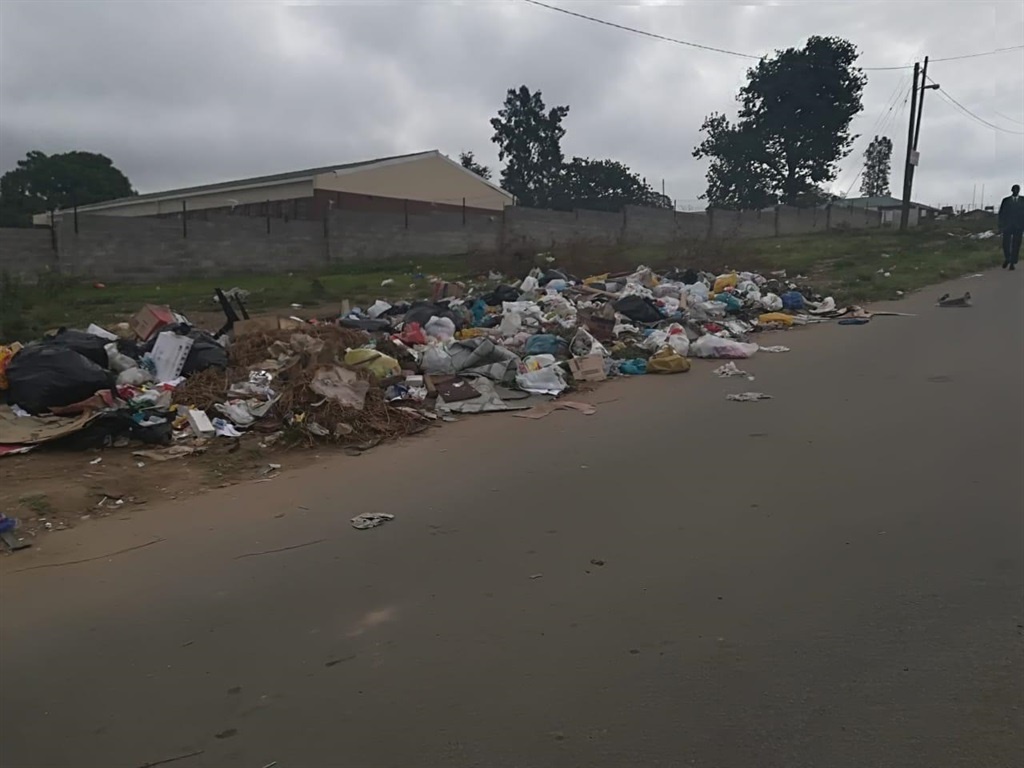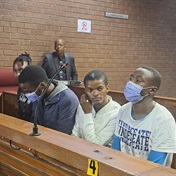
Mahikeng, the former pride of North West for its cleanliness and progressive policies, is now overrun with potholes, refuse and debt. Driving is a gamble and drinking tap water is an extreme sport. Mthatha is much the same. Poloko Tau and Lubabalo Ngcukana report from their home towns.
MAHIKENG
A song cut from one of motswako rapper Mo’ Molemi’s albums could provide the best evidence of just how long Mahikeng’s residents have endured driving on potholed streets.
The track Maspala (municipality) was supposed to have been included on the album Motsamai seven years ago.
In it, Molemi sings in Setswana: “Kere somebody thiba dipotholes, kara yame ya tlola every time I am on the road. Ke a go kopa maspala thiba di pothole; go konega rim every time I go home.”
Loosely translated, it says: “I say somebody fix the potholes; my car bounces every time I’m on the road. I beg of you municipality fix the potholes; rims get damaged every time I go home.”
For the past few weeks, Maspala has gone viral after being released online.
“The song could not be released in 2011, but I later released it on Facebook. It did not trend until now when permission was sought to release it digitally and I agreed. The guys thought it would be relevant, given the state of Mahikeng, other municipalities and the VBS scandals,” said Molemi, who lives in the neighbourhood full-time as a cattle and crop farmer.
But even before Molemi recorded his song, potholes were big in Mahikeng. Its residents have changed the town’s catchphrase from “the city of goodwill” to “the city of potholes”.
“One radio presenter, who is now late, used to say jokingly on air that when you see a car zigzagging in the streets of Mahikeng, you must know that the driver is sober. If you see one car moving just straight up the road, the likelihood is that the driver is intoxicated and driving all over those potholes,” Molemi said.
Like many from the North West capital, Molemi worries about the state of his city.
“Mahikeng used to be progressive, well-developed and beautiful, but when I look at it today I see regression. Things are bad here; every time I decide to try drink tap water I almost immediately get stomach ache and diarrhoea, hence I buy water. But there are poor people out there who can’t afford R1 for a litre of water,” he says.
In October last year, the Mahikeng Local Municipality launched a high court bid to have VBS Mutual Bank liquidated in an attempt to recover the R84 million it had deposited.
Of that amount, R69.1 million didn’t even belong to Mahikeng, it was a duplicate payment of its equitable share from National Treasury which it did not repay.
Molemi says he’s not proud to live in a city that looks nothing like a provincial capital should, with no public swimming pool or recreational parks.
ESKOM DEBT
Mahikeng Local Municipality owes Eskom more than R20 million for electricity consumed by its street lights, an amount that was compounding as the city decided to invest in VBS.
As the capital of Bophuthatswana, Mafikeng (now Mahikeng) became a model for other apartheid Bantustans because of its infrastructure, cleanliness and development.
But as much as they don’t want to return to those Bantustan days, Mahikeng residents marvel at what it used to be compared with what it is now.
Municipal spokesperson Yoliswa Tiro blames perpetual service delivery challenges on a “lack of political and administrative leadership”.
“While the municipality is not entirely happy with the overall state of Mahikeng, we hope the residents note the improvements that have been taking place and are excited at the prospects of being a clean and progressive town,” Tiro says.
“There is still a lot to be done in terms of refuse, potholes, lighting and water provision, and we have no doubt that it can all be achieved if the community of Mahikeng works together with the leadership of the municipality.”
For many residents, however, there is little to notice and hope has run dry.
Many ask why the city owes so much to Eskom for street lights when the roads are dark at night and most of the lights don’t work.
This is because Eskom sets a monthly charge per street light, working or not.
Mahikeng faces a sizable entry in its audit report from the Auditor General for fruitless and wasteful expenditure, as the municipality faces a massive debt for electricity that was never used.
“It is indeed true that most of the street lights in Mahikeng are not working and that is owing to underground cables that need to be repaired, while others needed to be replaced completely,” says Tiro, adding that they’ve also had cable theft problems and have been transitioning to new LED technology street lights for the past five years.
“We are mindful of the R20 million owed to Eskom and have subsequently lodged a dispute since the money owed includes areas where the street lights were replaced by Apollo lights.”
LOOKS LIKE A DUMP, SMELLS LIKE A DUMP
Effectively losing R86 million to VBS means Mahikeng not only looks like a dump, but smells like one too.
Because the city’s refuse collection trucks were repossessed towards the end of last year, mountains of illegally dumped refuse brought an invasion of flies during the festive season.
The municipality said the trucks were “repossessed by the service provider owing to non-payment and as a result the municipality was left without machinery to execute its duties”.
“Municipal employees embarked on a wildcat strike during the same period that the municipality lost machinery and that was a major setback,” Tiro added.
She said Premier Job Mokgoro’s office has brought a privately owned truck to start clearing the backlog and clear illegal dumping sites.
But back to the potholes of legend.
A drive across the municipality is proof of the seriousness with which the council wishes to prevent traffic accidents.
There are speed humps on most main roads – within metres of potholes.
“We appreciate speed humps very much, but in some cases how am I expected to negotiate my way around potholes and then still have an array of speed humps almost immediately thereafter?” asks taxi driver Gift Obusitswe.
“I think potholes are better speed deterrents already. Why not take all the asphalt concrete used for speed humps and patch potholes rather and then deter speed later after we have been saved from damaged wheels?”
Barba Gaoganediwe, who now lives in Johannesburg and works as the head of destination promotions and marketing for the Gauteng Tourism Authority, still regards Mahikeng as home.
He’s been vocal about the desperate state of his home town.
Gaoganediwe says he can only think of the stench and flies from an illegal dumping site next to his parents’ house in Unit 7, which his ill father has to live with daily.
“I love my home town and care about it very much, but I doubt that those in charge of its administration do,” Gaoganediwe said.
“There is no municipality in Mahikeng. In fact, there never has been. This comes from the history of a town set up by the Bophuthatswana government, which was a national municipality that had its services provided by national departments.”
WATER SALES ROCKET
The sight of residents carrying containers of water from the shops has become common in Mahikeng, as muddied and foul-smelling water comes out of the taps.
Most residents resort to buying water for drinking and cooking, with tap water only used for bathing, gardening and laundry.
The municipality insists that the water, provided by utility Botshelo Water, is “safe to consume and we have not had any complaints or concerns from the department of health”.
“The occasional smell coming from the water is caused by algae during the summer time, however, when the purification process takes place at the treatment plant the smell goes away,” Tiro says.
Gaoganediwe, who claims to be a “proud ANC member” asks the same question many others have posed.
“We have a premier, MECs, a mayor and other senior officials who drive to work every day through these potholes, go back home to dark streets and get dirty water coming out of their taps like every other resident. Do they really have any burning desire to fix things and are they passionate about this city at all?”
MTHATHA
It might be known widely as “small Jozi” because of its high crime rate, but Mthatha is now well known for other things too – none of them good.
Almost all the town’s suburbs are dark at night because the street lights, from which broken wires hang exposed, don’t work.
This leaves the town’s already skilled carjackers and muggers to do more of their nefarious work.
Refuse stays uncollected for days with no word from the King Sabata Dalindyebo municipality about why workers are not doing their jobs.
Every street corner is an eyesore, piled with black refuse bags.
Sewage flows through the streets and nobody appears to care. Residents cover their noses, trying to avoid the stench from blocked sewerage pipes which burst almost daily.
Illegal dumping sites have proliferated all over town, thanks to the municipality’s failure to implement its own by-laws.
Although the by-laws don’t allow this, caravan stands selling takeaways can be seen on every street corner in the city’s clogged CBD.
Hawkers have designated areas but refuse to occupy the stalls the council gave them, saying they are too far away from their customers.
The constant power outages are an added burden.
Anele Xhamela, who lives in the suburb of Khwezi, said he was forced to buy a generator because the municipality cannot ensure the lights will stay on.
“We go for three days at a time without electricity here in Khwezi, especially here in my street. This has been going on for years now. We have complained and nothing has come of it. Things were better in the old days. We never used to have these problems,” he said.
Xhamela, a businessperson who works from home, said Mthatha was a shadow of its former self.
“We used to have stable electricity and it was cheaper. Now we have expensive electricity which is mostly useless. I have lost count of the many electrical appliances that have been damaged because of unannounced power cuts. For us load-shedding is a daily occurrence,” he said.
“I have a house in Port Edward where my wife and kids stay. I just could not bring my family to stay under these conditions. But I am forced to remain here because most of my business is based this side. If it was not for that I would have been long gone.”
Xhamela is furious at having to pay rates each month for streets strewn with potholes and uncollected refuse.
“Each and every month you get a letter from the municipality to pay rates for electricity and water. But you don’t even know what rates you are paying for because even the water is dirty and when you open the taps you can see that the water is not clean,” he said.
Don’t get residents started on the potholes. And a functioning traffic light is a rare sight in town.
The older suburbs – Northcrest, Hillcrest and Norwood – are worst hit. But even the most affluent neighbourhoods, such as Southridge Park and Fortgale, are not spared.
Southridge Park resident Pasika Nontshiza, who has lived in Mthatha for decades, was not surprised by how the city had degenerated, thanks to what he said was a lack of leadership and planning vision.
“Since 2000, with the introduction of wall-to-wall municipalities, there has been nothing that has been improved. Havoc has been brought to our suburbs,” he said.
Nontshiza said the city’s limited capacity had been further strained by mushrooming townships around Mthatha, such as the Mandela, Slovo and Chris Hani parks, which added many more thousands of residents to exist on already constrained resources.
“There is pressure on the local authority to accommodate people who are not even ratepayers of the community. This has resulted in Mthatha degenerating to a level where it has become a dump site due to the lack of political leadershipand poor administrative ability and integrated planning,” he said.
Nontshiza, the chairperson of the Mthatha Stakeholders Forum, said there was no good reason the town had no highway.
He said it also “boggles the mind” why the city had been allowed to crumble when the province’s premier, Phumulo Masualle, comes from Mthatha.
Attempts to obtain comment from municipality spokesperson Sonwabo Mampoza drew a blank. He did not respond to phone or text messages.
In 2009 former president Jacob Zuma set aside R5 billion to revitalise Mthatha’s decaying infrastructure and to build water-purification plants.
But in 2017 Auditor-General Kimi Makwetu found that the municipality had racked up R1.1 billion in irregular expenditure.
Last week the sad state of Mthatha’s affairs was again thrust under the spotlight when SA Airlink suspended all flights between Mthatha and Johannesburg.
Mthatha’s airport was downgraded for failing to adhere to safety regulations.
A two-week strike by municipal workers ended last Thursday, resulting in them cleaning the streets they had strewn with refuse during the protest.
Mthatha resident Vuyisile Ntlabathi, president of the Eastern Cape business chamber, wants the province to intervene urgently in the city’s management.
“I have not seen anything like this in Mthatha before. I have been living in this town for decades and I have not witnessed this type of madness. The situation is killing our businesses. Everyone is affected, from hawkers to established businesses. No one is able to trade under these circumstances,” he said.
“It’s such a shame. Police are not doing anything; there is just lawlessness. The whole city is an eyesore and a health hazard. That is why we agree with those who are calling for the provincial government to place the municipality under an administrator.”
Mamkeli Ngam, cooperative governance and traditional affairs spokesperson, said MEC Fikile Xasa had dispatched two teams of officials to Mthatha to help the municipality – one to deal with labour issues and the other to investigate allegations of fraud, maladministration and corruption.
The residents hope they succeed.




 Publications
Publications
 Partners
Partners











